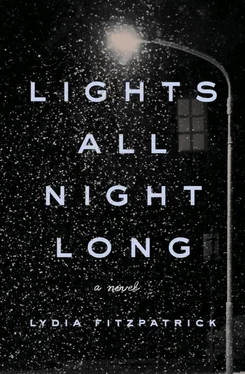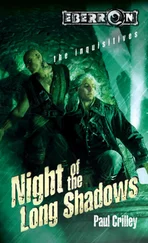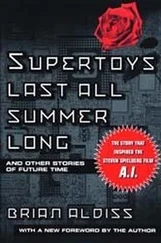Lydia Fitzpatrick - Lights All Night Long
Здесь есть возможность читать онлайн «Lydia Fitzpatrick - Lights All Night Long» весь текст электронной книги совершенно бесплатно (целиком полную версию без сокращений). В некоторых случаях можно слушать аудио, скачать через торрент в формате fb2 и присутствует краткое содержание. Город: New York, Год выпуска: 2019, ISBN: 2019, Издательство: Penguin Press, Жанр: Современная проза, на английском языке. Описание произведения, (предисловие) а так же отзывы посетителей доступны на портале библиотеки ЛибКат.
- Название:Lights All Night Long
- Автор:
- Издательство:Penguin Press
- Жанр:
- Год:2019
- Город:New York
- ISBN:978-0-52555-873-6
- Рейтинг книги:3 / 5. Голосов: 1
-
Избранное:Добавить в избранное
- Отзывы:
-
Ваша оценка:
- 60
- 1
- 2
- 3
- 4
- 5
Lights All Night Long: краткое содержание, описание и аннотация
Предлагаем к чтению аннотацию, описание, краткое содержание или предисловие (зависит от того, что написал сам автор книги «Lights All Night Long»). Если вы не нашли необходимую информацию о книге — напишите в комментариях, мы постараемся отыскать её.
Lights All Night Long — читать онлайн бесплатно полную книгу (весь текст) целиком
Ниже представлен текст книги, разбитый по страницам. Система сохранения места последней прочитанной страницы, позволяет с удобством читать онлайн бесплатно книгу «Lights All Night Long», без необходимости каждый раз заново искать на чём Вы остановились. Поставьте закладку, и сможете в любой момент перейти на страницу, на которой закончили чтение.
Интервал:
Закладка:
CHAPTER FOURTEEN
In Berlozhniki that last winter, birch trees slashed the horizon. Wind coaxed the snow into twisters, and Babushka murmured about snow children and snyeg demons and what it meant when the sun didn’t appear for seven days straight. Babushka seemed to be the only person who had not forgotten about Yulia Podtochina. Some nights, she claimed to feel Yulia’s spirit slipping under the door and whispering in her ear. Some days she said that Yulia left her handprints on the mirror in the bathroom.
In theory, Ilya had everything to be happy about. He’d be in America in less than a year. He’d taken practice boards with Maria Mikhailovna and scored close to perfect. The actual boards were only a month away, and that should have been all he thought about, but he kept picturing Vladimir on that bench with Sergey. The two of them leaning toward each other. Vladimir holding the lighter and Sergey the cigarette. The gesture old and practiced, like they were bratya, like they were actual brothers, and Ilya was nothing to them at all. And he kept seeing Vladimir running in Dmitri’s headlights. What if he’d slipped? he thought, over and over, panic bubbling in his gut until he’d replayed the night to its end: Dmitri turning into the kommunalkas, his headlights shining on nothing but the snow falling as endlessly and innocently as ever.
One day he came home from school to find Babushka crying on the couch. Timofey was sitting next to her, looking small and a little lost. He patted her knee and murmured, “Tchoo, tchoo,” which was exactly what Babushka used to whisper to Ilya and Vladimir when they skinned their knees or needed garlic in their ears to get rid of an ache.
“What is it?” Ilya said, though he knew: Vladimir was hurt. He’d broken something, had wound up in the clinic or prison or dead.
“We were robbed,” Babushka said.
The apartment looked as it always looked: clean but cluttered. His mother and Babushka were neat, but they could not bear to throw things away, and so every surface—the counters, the kitchen table, the top of the TV—had the feeling of space about to be engulfed. Ilya looked at the door. The lock was cheap—it would pop out with one knock from a hammer. But it was in place.
“What did they take?”
“The samovar, your mother’s spoon, her rings, your grandfather’s medals, the vouchers—” She stopped, and Ilya thought a new wave of tears might come, but she swallowed and was quiet.
Timofey patted her knee. “They left the TV, though,” he said, “and the stove and the space heater. The important things.”
“Those are not the important things,” Babushka said. “They were probably too lazy to carry the TV down the stairs.”
“It’s true,” Timofey said. “Even thugs are lazy nowadays.”
The medals were his grandfather’s—“For Distinguished Labor” and “Veteran of Labor”—and Babushka had kept them in a tiny felt satchel inside a box of Q-tips in the drawer by her bed. His mother’s silver spoon—with the unknown initials carved in the handle—lived in a dusty depression above the kitchen cabinets along with the vouchers that they’d been given during perestroika without ever being told how to exchange them. The samovar was nestled in the depths under his mother and Babushka’s bed, hidden from the world by a warren of shoeboxes full of pictures and newspaper clippings and socks that needed mending and summer clothes that they never ever wore. Everything that had been stolen had been precious and nearly impossible to find.
Ilya dragged his crate out from under the couch. His clothes were all still there. His textbooks and exam prep books, his skates, and the decade-old New York City travel guide that he’d found at the bookshop and bought himself for his birthday were too, but his tape player was gone, and the Delta headphones, and all of the Michael & Stephanie tapes.
“Did they take anything of yours?” Babushka said.
Behind her legs, he could see Vladimir’s crate. It had been completely emptied.
“No,” he said, because she looked so forlorn. “Everything’s still here.”
“That’s a relief,” she said. “They probably wouldn’t know what to do with a book if it hit them in the nose.”
Ilya stood. His chest was tight. It must have taken Vladimir a half hour to catalogue exactly what they had that was worth taking, and to gather it all, and at the thought Ilya could feel blood pumping in his hands, as though they were growing rapidly, and he wanted desperately to use them on something, to punch the wall or splinter the door, the way men did in movies. “I’ll go ask if anyone saw anything,” he said.
“No,” Babushka said, with enough force that Ilya understood that she suspected Vladimir too. “We don’t want the police mixed up in this. It’s not worth it. You hear? Ilya?”
Ilya nodded.
“Will you put on the kettle?” Babushka said.
Ilya filled the kettle from the pitcher on the counter and lit the stove. He watched the flame, and after a minute he could feel his hands relaxing, shrinking back to normal.
On the couch, Timofey said, “At least they didn’t take the kettle.”
“Pravda,” Babushka said. “We have the kettle.”
Weeks passed. On New Year’s, Medvedev gave his speech, with the Kremlin ablaze behind him. Babushka kept saying that at least they still had their TV, that at least they got to watch the speech.
“Right,” Ilya’s mother said, “what luck,” and she disappeared into the bedroom, and then Babushka fell asleep, and Ilya muted the TV and listened to the sound of fireworks cracking in the sky.
Ilya didn’t see Vladimir in town anymore, and sometimes he wondered if he’d left Berlozhniki entirely. He imagined Vladimir and Sergey clinging to the back of one of the semis that braved the roads all winter. Sergey claimed that his older brother had done that once, though his brother had been in Berlozhniki for as long as Ilya could remember, working at an auto shop, father to three kids who’d all inherited his and Sergey’s skin, which was as patchy as a rotten potato.
The more Ilya thought about Vladimir, about the stolen tapes, about the fact that he had mustered the energy to rob them but had not bothered to try to see Ilya in almost three months, the larger his hurt grew, and over time he found that he could cook it into hatred. He should have hated Vladimir, of course, but it was hard to hate someone whom you never saw, so instead he hated his mother. He hated the way her eyes turned down at the corners. The noisy way she ate. The fatness of her ass. The skinniness of her legs. She couldn’t say his name without it sounding like a plea. He hated her blind hope and stupid trust. There were other mothers, he knew, who helped their children with schoolwork, who did not stink of yeast and sleep all day. Grigori Alexandrov’s mother had written out a five-year study schedule as soon as his talent in math had become apparent; Ilya’s mother did not even know the date of the boards, though that did not stop her from applying pressure that Ilya didn’t need. And there was the way she had picked him as the smart one and defined Vladimir by default: the idiot, the failure, trouble through and through. In more rational moments, he remembered the folder of math homework, the term card filled with 1s, the fact that Vladimir had said he would try and had not. He remembered that Vladimir had left of his own accord, but what sort of mother let her son leave? Why had she not gone to find him? And would she have if Ilya and his promise had never existed? At the hot center of his anger was a fact that he tried his best to ignore: Vladimir had not been home since the night Maria Mikhailovna had told them about the exchange. Vladimir had not wanted to be left, and when Ilya thought of that night, he hoped that he had looked his brother in the eyes, that he had at least considered not abandoning him, but of course that wasn’t the case. He’d said, “Yes,” more loudly and clearly than he’d said those first words of English nearly a decade before.
Читать дальшеИнтервал:
Закладка:
Похожие книги на «Lights All Night Long»
Представляем Вашему вниманию похожие книги на «Lights All Night Long» списком для выбора. Мы отобрали схожую по названию и смыслу литературу в надежде предоставить читателям больше вариантов отыскать новые, интересные, ещё непрочитанные произведения.
Обсуждение, отзывы о книге «Lights All Night Long» и просто собственные мнения читателей. Оставьте ваши комментарии, напишите, что Вы думаете о произведении, его смысле или главных героях. Укажите что конкретно понравилось, а что нет, и почему Вы так считаете.












